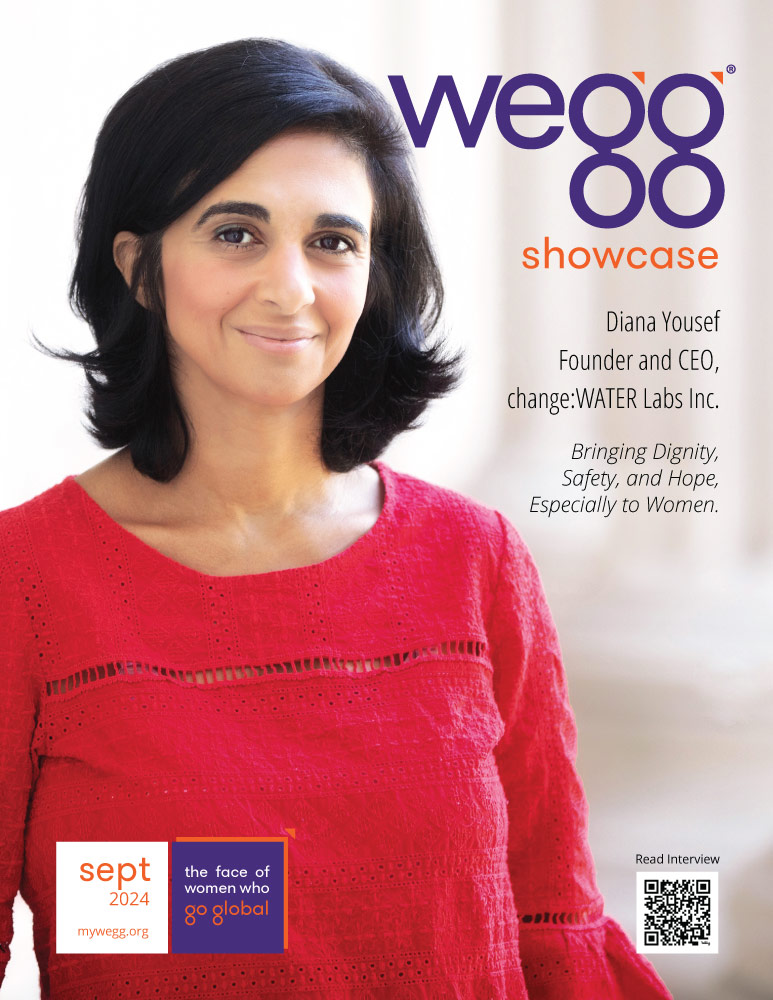wegg® showcase: Diana Yousef, Founder and CEO, change:WATER Labs Inc.
August 30, 2024BruceDayneIssue 4: September 2024

What inspired you to start change:WATER Labs?
A number of years back, I was working with NASA to consider technology options for recycling water on the space station. One option was using breathable materials to separate water from waste, which NASA could then reuse for space agriculture. When trying to get rid of wastewater, I immediately appreciated that breathable materials could simplify that by doing the equivalent of evaporating water (i.e., subtracting the water out of the waste, instead of most wastewater treatment options, which removes waste from the water) but without actually boiling off the water (which costs a lot of energy). As a low-energy option to separate molecular water from waste, it occurred to me that this solution not only could be used in space, but also held possibilities for better sanitation for places here on Earth without water treatment or reliable power.
A few years later, I had my first baby and we moved from New York to Boston. Because I didn’t have a job that came with me, my career took a complete nose-dive off a cliff. To reboot myself, I tried working with various startups in the Boston area, but I wasn’t making a lot of progress. So I decided to start my own, launching change:WATER Labs to work on this concept of pulling water out of waste and returning it back in its purest form. Was it obvious that this was what I should work on? No, but it was literally the only idea I had at the time!
What is your solution?
Our iThrone is a drop-in, waterless, no-flush toilet that needs no sewer hookup. It contains a bag made of evaporative membranes that sucks the water out of human waste and returns it to the air as molecular water, the purest form of water. Since 95 percent of what comes out of us is water, the waste essentially shrinks and mostly disappears. The dry concentrated biomass that’s left can either be disposed of or converted to energy or fertilizer.
What challenges did you encounter in starting your business?
When I started, all I had was an idea. I didn’t have technology, money, a team, or a place to experiment. Early on, I was asked to give a quick pitch of my idea in front of television cameras, and what came out was a disaster. I realized that if I couldn’t tell the story in a way that ignited interest, it didn’t matter how great my idea was, I should just pack up and go home. That’s when I came up with “shrink wrap for crap,” a visual and entertaining way to explain our solution. Once I was able to articulate the idea that way, I started to attract team members and seed funding, and we went from concept to development to product, and then validation in the field.
Your solution has ramifications for women in places without water treatment.
Initially, I wasn’t sure if we would use this solution to target clean drinking water or sanitation. My decision to focus on sanitation came from seeing the massive human displacement in my home region of the Middle East—from Iraq, Yemen, Syria—and learning about how utterly devastating it is for displaced people to live without access to toilets. I learned from talking to workers in refugee camps how a lack of safe sanitation deprived people of privacy, dignity, safety and cleanliness. This is especially treacherous for women and girls. Just to perform a basic human function, females have to go in public, exposing themselves in a way they don’t want to. This leads to sanitation-related gender-based violence (GBV), where they are susceptible to sexual assault on a daily basis whenever they have to answer Nature’s call.
Access to safe toilets also means access to education, especially for girls. Fifty percent of schools in the world do not have proper toilet facilities. To make it through a full day of school without using the toilet, female students are not eating or drinking, and they’re getting infections from holding their urge. When they start menstruating, they miss a week of school every month and fall behind. At some point, they are so far behind that they drop out. More than 20 percent of girls drop out for lack of toilet facilities at school.
What advice would you give aspiring women entrepreneurs?
I think a lot of women professionals deal with impostor syndrome. We take every criticism to heart. For me, I initially questioned “What right do I have to think I’m the one to solve this problem?” Eventually, I came to see that because I was the only one out here doing this, I was, by default, the expert. When I started, did I know that it was going to work? No, but this is legitimately an ambitious thing we’re doing. Nobody starting something new knows for certain that it’s going to work. I don’t have to apologize for going after something ambitious and not having all the answers upfront. Once I got over my imposter syndrome, I was able to move forward more boldly and confidently.
For women founders, when someone is questioning your abilities, very likely the root of that comes from your being a female. Don’t bother to invest in that conversation. I’m not saying that everything we do is wonderful and every idea we have is great; we must always question things to make sure we are course-correcting. But when you have an ambitious vision, you need to be surrounded by champions. Find your champions.
DMTBeautySpot
via https://dmtbeautyspot.com
Bob Marovich, DMT.NEWS, DMT BeautySpot,



0 comments